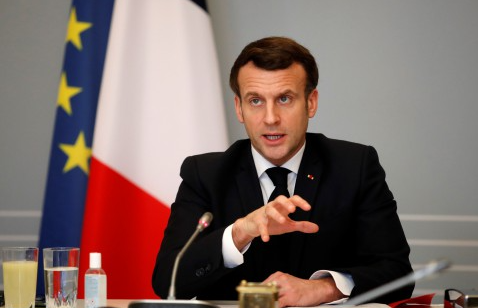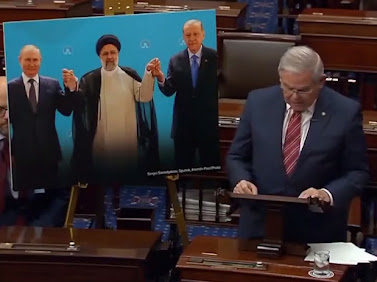
At the same time US think-tank-experts warn of the difficulty of disrupting the Iranian drone program by the Americans and Europeans, Iran announces that the Russian Sukhoi-35 will arrive in Iran next March
The magazine added, in a report, that “the United States has for years imposed sanctions on Iran’s military-industrial complex and manufacturing base, including entities such as IAIO (which designs and manufactures Mohajer-6 medium-range reconnaissance and combat drones), and HESA and FACI, Iranian Helicopter Support and Refurbishment Industries (PAHNA), and Iranian Aircraft Industries (IACI), to name a few.
However, "the Iranian aviation sector and the drone industry continued to expand and prosper, and Western sanctions could not prevent Iran from becoming a prominent player in the military drone market, and sharing the technology of these drones with partners and agents inside and outside the Middle East," he said. National Interest.
According to the magazine, "Despite the US sanctions on the companies that manufacture Iranian drones, Russia used Iranian drones in the war in Ukraine, such as the Shahed-136, which paralyzed Ukraine's vital infrastructure," she said.
In addition to increasing sanctions against Iranian drone companies, the magazine stated that "Washington intends to impose controls on exports and pressure on private companies to disrupt the technological supply chain related to the drone industry in Tehran, especially with the emergence of reports stating that Shahed 136 is manufactured with American and British components, which made It shows Tehran's extraordinary ability to bypass sanctions."
But, as with Western sanctions, "more export controls and corporate pressure are unlikely to significantly reduce Iran's access to these components," according to the National Interest.
The reason for this, the magazine explained, is, first, "the incorporation of foreign components into a robust drone program with an established supply chain." And secondly, states cannot prevent companies like eBay or Alibaba from selling dual or multi-use technology to Iran and other countries.
In the context, the National Interest spoke about the Iranian drone sector, noting that "Iran has manufactured and operated military drones since the Iran-Iraq war in the mid-1980s."
"With more than 33 examples, Iran's highly advanced military drone complex forms one of the four pillars of its security strategy and force structure, complementing missile technology, proxy forces, and electronic warfare," she added.
The National Interest report stated, "Iranian drones are cheaper than their Western counterparts, and have proven effective on the battlefield, whether against local and regional militants, or US assets and allies in and around the Gulf."
Likewise, "drones have enabled Iran to project its power and earn profits, display technology and enhance its prestige, strengthen alliances, and influence conflicts in the Middle East and beyond," according to the magazine.
To this end, the National Interest noted, “Iran has delivered drones and their designs, components, and training to partners in Iraq, Lebanon, and Yemen, as well as to foreign governments such as Ethiopia, Russia, Sudan, Syria, and Venezuela—transactions facilitated by the end of the UN arms embargo on Iran in October 2020".
According to the National Interest, "the Iranian leadership adopts a whole-of-government approach, using all available tools, from regime elites studying at universities abroad to electronic espionage, to gain access to the latest technology."
She added, "Iran's high human capital can allow it to accelerate domestic production of UAV components, and such a result can be achieved thanks to the first-class scientists, technicians, engineers and mathematicians produced by Sharif University of Technology and other distinguished Iranian educational institutions."
"Given the difficulty, if not the impossibility, of disrupting Iran's drone program through economic sanctions and export controls, the United States would do well to adopt a new strategy," the National Interest continued.
She explained, "This strategy would seek to use an innovative and comprehensive approach to break the endless cycle of imposing US sanctions and avoiding Iranian sanctions."
Iran announces that the Russian Sukhoi-35 will arrive in Iran next March
Speaking to Tasnim, member of the Iranian Parliament’s National Security and Foreign Policy Commission Shahriar Heidari said the Sukhoi Su-35 fighter jets that Iran has ordered from Russia are going to arrive in early 1402 (begins on March 21).
 The lawmaker noted that Iran has also ordered a series of other military equipment from Russia, including air defense systems, missile systems and helicopters, most of which will be received soon.
The lawmaker noted that Iran has also ordered a series of other military equipment from Russia, including air defense systems, missile systems and helicopters, most of which will be received soon.
Some of the combat aircraft are anticipated to be housed at Tactical Air Base (TAB) 8 of the Islamic Republic of Iran Air Force (IRIAF), which is located in the Iranian city of Isfahan in the country's center.
Russia’s United Aircraft Corporation (UAC) says the Sukhoi Su-35 fighter jet “combines the qualities of a modern fighter (super-maneuverability, superior active and passive acquisition aids, high supersonic speed and long range, capability of managing battle group actions, etc.) and a good tactical airplane (wide range of weapons that can be carried, modern multi-channel electronic warfare system, reduced radar signature, and high combat survivability).”
Iran and Russia have signed major deals in recent months to boost their economic, trade, energy and military cooperation.











































